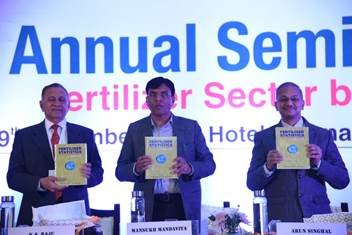Union Minister Mandaviya inaugurates FAI Annual Seminar in New Delhi
Focus in the seminar will be on tech for green fertilisers, sustainable agriculture, green financing and optimising cost of logistics
Union Minister of Chemicals and Fertilisers, and Health and Family Welfare, Mansukh Mandaviya inaugurated Fertiliser Association of India (FAI) Annual Seminar 2022 (Fertiliser Sector by 2030) at New Delhi. Arun Singhal, Secretary Department of Fertilisers, Arvind Chaudhary, DG FAI, KS Raju, Chairman FAI and representatives of Industries and other senior officials of the Ministry were also present on the occasion.
This year FAI Annual Seminar is devoted to the theme ‘Fertiliser Sector by 2030’ and there will be presentation on technologies for green fertilisers, worldwide developments in sustainability area, sustainable agriculture, green financing and optimising cost of logistics. The presentations and discussion in the Seminar will result in some useful recommendations which will be useful for policy makers and for all those concerned with farm and fertiliser sectors.
While addressing the occasion, Mansukh Mandaviya stated that one of the important components for ensuring food security is fertilisers. He said that during the last three years, there has been a huge increase in fertilisers and raw materials prices. The minister informed “our government has brought various reforms and ensured that fertilisers are made available at affordable prices to Indian farmers. We have done this by increasing the amount of fertiliser subsidy from $10 Billion for the pre-pandemic year 2019-20 to almost $27 Billion in the current year.
The Minister further said “The world today faces severe challenges in the rising costs and availability of fertilisers. There is a dire need for our global partners to have reasonable and transparent mechanisms and take long-term views in dealing with issues of fertilisers in the larger interest of global food security”. He added that the world is still dealing with three shocks conflict in Ukraine, the consequences of Covid 19 and climatic disturbances. Together these factors make a powerful case to grow our supply chains and strengthen self-reliance to meet food and health security goals.
Mandaviya said,“Long-term Agreements and MoUs will have an important role to play in making steady progress in this direction. Our government has facilitated various such agreements and MoUs between Indian Fertiliser companies and foreign suppliers to ensure stability in fertiliser supplies to our farmers”.
He added, “India’s economic recovery is propelled by reforms in various areas including manufacturing, labour, agriculture, education, and of course, improving the ease of doing business. Towards this direction, concrete steps are taken to promote Make in India’ in the fertiliser sector by reviving 5 closed urea plants. By 2025, India will become self-sufficient in urea. One of the recently introduced schemes of our government is ‘One Nation One Fertiliser’ under which Urea, MOP, DAP and NPK will be sold under the uniform Bharat brand to bring uniformity in the quality and brands”.
The minister also informed another initiative introduced is the concept of “Pradhan Mantri Kisan Samriddhi Kendras” to convert all retail fertiliser outlets of about 3 lakhs into single window service centres for the farmers.
The Chemical and Fertilisers Minister strongly urged the industry to look at developing new farm solutions for improving nutrient use efficiency as it positively impacts the entire value chain and will significantly help in achieving sustainable goals. He also said that the industry must drive research efforts towards alternative fertilisers and new-age smart solutions. Nano fertilisers are an excellent example towards optimising efficiency, economy and ecology.
On this occasion, Union Minister also released three FAI publications and FAI Data portal. This portal will create a uniform data base and avoid manual input of data by FAI.
Focus in the seminar will be on


